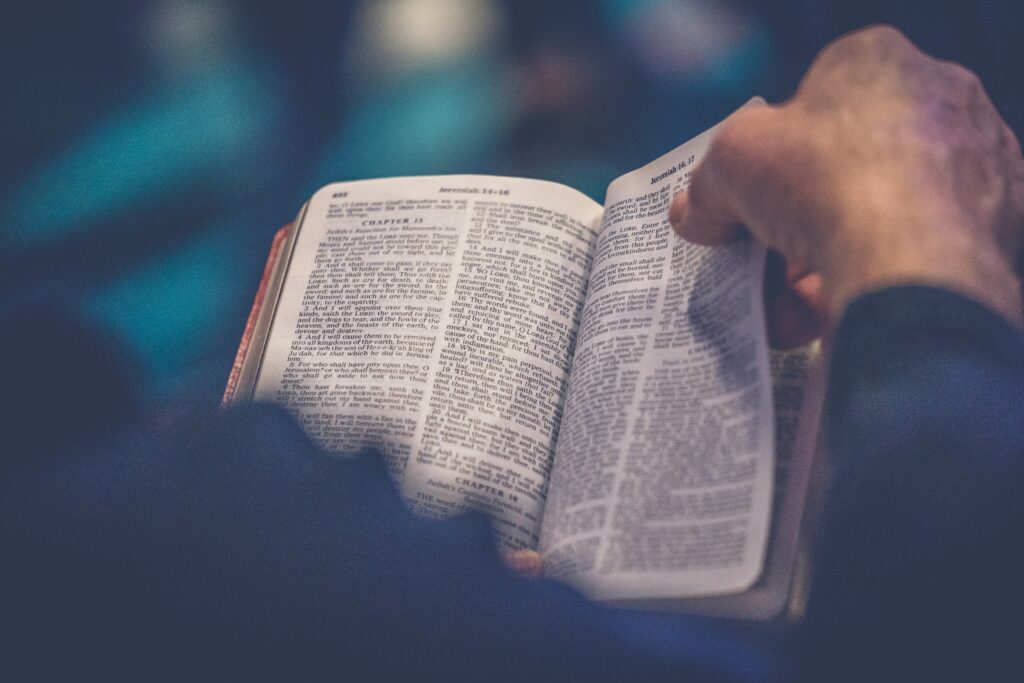
By Sam Shamoun (Original article 1, 2, 3)
In this post I share some of the earliest surviving evidence for the authorship of the Gospel. In one of the references, I quote Irenaeus who was a disciple of Polycarp, who himself was a disciple of the Apostles such as the Apostle John. This is significant since it provides an unbroken historical chain that goes back to the very eyewitnesses of the Lord Jesus Christ. All emphasis will be mine.
The Muratorian Fragment c. 170 AD
The Muratorian Fragment is the oldest known list of New Testament books. It was discovered by Ludovico Antonio Muratori in a manuscript in the Ambrosian Library in Milan, and published by him in 1740. * It is called a fragment because the beginning of it is missing. Although the manuscript in which it appears was copied during the seventh century, the list itself is dated to about 170 because its author refers to the episcopate of Pius I of Rome (died 157) as recent. He mentions only two epistles of John, without describing them. The Apocalypse of Peter is mentioned as a book which “some of us will not allow to be read in church.” A very helpful and detailed discussion of this document is to be found in Bruce Metzger’s The Canon of the New Testament (Oxford: Clarendon Press, 1987), pp. 191-201. Below is Metzger’s English translation of a critically amended text of the Fragment, from Appendix IV of the same book (pp. 305-7). I include Metzger’s footnotes, with their original enumeration, and add some supplementary footnotes of my own. —M.D.M.
* Ludovico Antonio Muratori, ed., Antiquitates Italicae Medii Aevi, v. 3 (ex typographia Societatis palatinæ, Mediolani, 1740). Reprinted in Bologna, 1965.
THE MURATORIAN CANON
The following translation usually follows the amended text edited by Hans Lietzmann, Das Muratorische Fragment und die Monarchianischen Prologue zu den Evangelien (Kleine Texte, i; Bonn, 1902; 2nd ed., Berlin, 1933). Owing to the wretched state of the Latin text, it is sometimes difficult to know what the writer intended; several phrases, therefore, are provided with alternative renderings (enclosed within parentheses). Translational expansions are enclosed within square brackets. The numerals indicate the lines of the original text. For a discussion, see chap. VIII.1 above, where freer renderings are sometimes given in place of the following literalistic translation.
. . at which nevertheless he was present, and so he placed [them in his narrative]. [1] (2) The third book of the Gospel is that according to Luke. (3) Luke, the well-known physician, after the ascension of Christ, (4-5) when Paul had taken with him as one zealous for the law, [2] (6) composed it in his own name, according to [the general] belief. [3] Yet he himself had not (7) seen the Lord in the flesh; and therefore, as he was able to ascertain events, (8) so indeed he begins to tell the story from the birth of John. (9) The fourth of the Gospels is that of John, [one] of the disciples. (10) To his fellow disciples and bishops, who had been urging him [to write], (11) he said, ‘Fast with me from today to three days, and what (12) will be revealed to each one (13) let us tell it to one another.’ In the same night it was revealed (14) to Andrew, [one] of the apostles, (15-16) that John should write down all things in his own name while all of them should review it. And so, though various (17) elements [3a] may be taught in the individual books of the Gospels, (18) nevertheless this makes no difference to the faith (19) of believers, since by the one sovereign [3b] Spirit all things (20) have been declared in all [the Gospels]: concerning the (21) nativity, concerning the passion, concerning the resurrection, (22) concerning life with his disciples, (23) and concerning his twofold coming; (24) the first in lowliness when he was despised, which has taken place, (25) the second glorious in royal power, (26) which is still in the future. What (27) marvel is it then, if John so consistently (28) mentions these particular points also in his Epistles, (29) saying about himself, ‘What we have seen with our eyes (30) and heard with our ears and our hands (31) have handled, these things we have written to you? [4] (32) For in this way he professes [himself] to be not only an eye-witness and hearer, (33) but also a writer of all the marvelous deeds of the Lord, in their order. (34) Moreover, the acts of all the apostles (35) were written in one book. For ‘most excellent Theophilus’ [5] Luke compiled (36) the individual events that took place in his presence — (37) as he plainly shows by omitting the martyrdom of Peter (38) as well as the departure of Paul from the city [of Rome] [5a] (39) when he journeyed to Spain.
As for the Epistles of (40-1) Paul, they themselves make clear to those desiring to understand, which ones [they are], from what place, or for what reason they were sent. (42) First of all, to the Corinthians, prohibiting their heretical schisms; (43) next, [6] to the Galatians, against circumcision; (44-6) then to the Romans he wrote at length, explaining the order (or, plan) of the Scriptures, and also that Christ is their principle (or, main theme). [6a] It is necessary (47) for us to discuss these one by one, since the blessed (48) apostle Paul himself, following the example of his predecessor (49-50) John, writes by name to only seven churches in the following sequence: To the Corinthians (51) first, to the Ephesians second, to the Philippians third, (52) to the Colossians fourth, to the Galatians fifth, (53) to the Thessalonians sixth, to the Romans (54-5) seventh. It is true that he writes once more to the Corinthians and to the Thessalonians for the sake of admonition, (56-7) yet it is clearly recognizable that there is one Church spread throughout the whole extent of the earth. For John also in the (58) Apocalypse, though he writes to seven churches, (59-60) nevertheless speaks to all. [Paul also wrote] out of affection and love one to Philemon, one to Titus, and two to Timothy; and these are held sacred (62-3) in the esteem of the Church catholic for the regulation of ecclesiastical discipline. There is current also [an epistle] to (64) the Laodiceans, [6b] [and] another to the Alexandrians, [6c] [both] forged in Paul’s (65) name to [further] the heresy of Marcion, and several others (66) which cannot be received into the catholic Church (67)— for it is not fitting that gall be mixed with honey.
(68) Moreover, the epistle of Jude and two of the above-mentioned (or, bearing the name of) John are counted (or, used) in the catholic [Church]; [7] and [the book of] Wisdom, (70) written by the friends [7a] of Solomon in his honour. (71) We receive only the apocalypses of John and Peter, (72) [7b] though some of us are not willing that the latter be read in church. (73) But Hermas wrote the Shepherd (74) very recently, [7c] in our times, in the city of Rome, (75) while bishop Pius, his brother, was occupying the [episcopal] chair (76) of the church of the city of Rome. [7d] (77) And therefore it ought indeed to be read; but (78) it cannot be read publicly to the people in church either among (79) the Prophets, whose number is complete, [8] or among (80) the Apostles, for it is after [their] time. (81) But we accept nothing whatever of Arsinous or Valentinus or Miltiades, (82) who also composed (83) a new book of psalms for Marcion, (84-5) together with Basilides, the Asian founder of the Cataphrygians [8a] . . .
1 The meaning may be that Mark arranged the material of his Gospel in the order indicated by Peter, who was participant in the events narrated.
2 The reading of the Fragment, quasi ut uris studiosum, ‘as so to speak, one zealous for (or, learned in) the law,’ has been variously interpreted and/or emended. For example, Routh took iuris as translating του δικαιου, i.e. Luke was studious of righteousness; Buchanan replaced ut iuris with adiutorem, ‘assistant’; Bartlet supposed that the translator read νοσου as νομου (Luke was ‘a student of disease’); Zahn replaced ut iuris with itineris, thereby referring to Luke’s readiness to accompany Paul on his journeys; Lietzmann conjectured litteris, i.e. Luke was well versed as an author. Harnack (Sitzungsberichte der königlich Preussischen Akademie der Wissenschaften [1903], p. 213) and Ehrhardt (op. cit.), who retain iuris studiosus of the Fragment, have pointed out that in technical language of Roman law this could refer to an assesor or legal expert who served on the staff of a Roman official. Although this title was current prior to the time of Justinian’s Digest (published in 533) and so was available to the translator of the Fragment, it is anybody’s guess what Greek phrase it represented—assuming, of course, that the Canon was drawn up originally in Greek (unfortunately no help is provided in David Magie, De Romanorum iuris publici sacrisque vocabulis sollemnibus in Graecum sermonem conversis [Leipzig, 1905]).
It is significant that the Latin text of the Fragment appears to have been a source for Chromace of Aquileia, who in his commentary on Matthew (written between 398 and 407) refers to Luke as follows: Dominum in carne non vidit, sed quia eruditissimus legis erat quippe qui comes Pauli apostoli … (See Joseph Lemarie, ‘Saint Chromace d’Aquilee temoin du Canon de Muratori,’ Revue des etudes augustiniennes, xxiv [1978], pp. 101-2).
3 Here ex opinione is taken as the equivalent of εξ ακοης. Others conjecture ex ordine, representing καθεξης (‘orderly sequence.’ Luke i.3).
3a Latin, principia. —M.D.M.
3b Latin, principali. —M.D.M.
4 I John i.1-3.
5 Luke i.3.
5a That is, the city of Rome. This lack of specificity is one indication that the author was a Roman. —M.D.M.
6 The letter ‘b’ in the Latin text before ‘Galatians’ may belong to ‘Corinthians’ (προς Κορινθιους Β’).
6a Latin, principium. —M.D.M.
6b Tregelles writes, “It appears impossible to suppose that the cento of phrases from St. Paul’s genuine Epistles, often found in Latin MSS. under the name of Epistola ad Laodicenses, is here intended. … the writer seems to have intended the Epistle to the Ephesians, which Marcion altered, and to which he gave this name, either as part of his changes, or it may be from having obtained his copy of it from Laodicea.” (p. 47) —M.D.M.
6c Nothing is known of the Epistle to the Alexandrians mentioned here. —M.D.M.
7 It may be, as Zahn (Geschichte, ii, 66) and others have supposed, that a negative has fallen out of the text here.
7a Tregelles suggests that the Latin translator of this document mistook the Greek Philonos “Philo” for philon “friends.” Many in ancient times thought that the so-called “Wisdom of Solomon” was really written by Philo of Alexandria. —M.D.M.
7b The Apocalypse of Peter describes with some imaginative detail the torments of hell and the blessings of heaven. It was read with respect and used for admonition throughout the churches in early times. —M.D.M.
7c The Shepherd of Hermas is another work widely read in early times. It is a kind of moral allegory, like Bunyan’s Pilgrim’s Progress, but more impressive in that it purports to convey a series of divine revelations. —M.D.M.
7d This would be Pius I, bishop of Rome from about 142 to 157. —M.D.M.
8 Perhaps the Fragmentist means that there are three major Prophets and twelve minor Prophets.
8a The few words that follow this are unintelligible, and so the fragment practically ends here. —M.D.M.
Irenaeus c. 180 AD
Chapter 1 The apostles did not commence to preach the Gospel, or to place anything on record, until they were endowed with the gifts and power of the Holy Spirit. They preached one God alone, maker of heaven and earth…
1. We have learned from none others the plan of our salvation, than from those through whom the Gospel has come down to us, which they did at one time proclaim in public, and, at a later period, by the will of God, handed down to us in the Scriptures, to be the ground and pillar of our faith. For it is unlawful to assert that they preached before they possessed perfect knowledge, as some do even venture to say, boasting themselves as improvers of the apostles. For, after our Lord rose from the dead, [the apostles] were invested with power from on high when the Holy Spirit came down [upon them], were filled from all [His gifts], and had perfect knowledge: they departed to the ends of the earth, preaching the glad tidings of the good things [sent] from God to us, and proclaiming the peace of heaven to men, who indeed do all equally and individually possess the Gospel of God. Matthew also issued a written Gospel among the Hebrews in their own dialect, while Peter and Paul were preaching at Rome, and laying the foundations of the Church. After their departure, Mark, the disciple and interpreter of Peter, did also hand down to us in writing what had been preached by Peter. Luke also, the companion of Paul, recorded in a book the Gospel preached by him. Afterwards, John, the disciple of the Lord, who also had leaned upon His breast, did himself publish a Gospel during his residence at Ephesus in Asia. (Against Heresies, Book 3)
Tertullian c. 207 AD
Chapter 2. St. Luke’s Gospel, Selected by Marcion as His Authority, and Mutilated by Him. The Other Gospels Equally Authoritative. Marcion’s Terms of Discussion, However, Accepted, and Grappled with on the Footing of St. Luke’s Gospel Alone.
You have now our answer to the Antitheses compendiously indicated by us. I pass on to give a proof of the Gospel — not, to be sure, of Jewry, but of Pontus— having become meanwhile adulterated; and this shall indicate the order by which we proceed. We lay it down as our first position, that the evangelical Testament has apostles for its authors, to whom was assigned by the Lord Himself this office of publishing the gospel. Since, however, there are apostolic men also, they are yet not alone, but appear with apostles and after apostles; because the preaching of disciples might be open to the suspicion of an affectation of glory, if there did not accompany it the authority of the masters, which means that of Christ, for it was that which made the apostles their masters. Of the apostles, therefore, John and Matthew first instil faith into us; while of apostolic men, Luke and Mark renew it afterwards. These all start with the same principles of the faith, so far as relates to the one only God the Creator and His Christ, how that He was born of the Virgin, and came to fulfil the law and the prophets. Never mind if there does occur some variation in the order of their narratives, provided that there be agreement in the essential matter of the faith, in which there is disagreement with Marcion. Marcion, on the other hand, you must know, ascribes no author to his Gospel, as if it could not be allowed him to affix a title to that from which it was no crime (in his eyes) to subvert the very body. And here I might now make a stand, and contend that a work ought not to be recognised, which holds not its head erect, which exhibits no consistency, which gives no promise of credibility from the fullness of its title and the just profession of its author. But we prefer to join issue on every point; nor shall we leave unnoticed what may fairly be understood to be on our side.
Now, of the authors whom we possess, Marcion seems to have singled out Luke for his mutilating process. Luke, however, was not an apostle, but only an apostolic man; not a master, but a disciple, and so inferior to a master — at least as far subsequent to him as the apostle whom he followed (and that, no doubt, was Paul ) was subsequent to the others; so that, had Marcion even published his Gospel in the name of St. Paul himself, the single authority of the document, destitute of all support from preceding authorities, would not be a sufficient basis for our faith. There would be still wanted that Gospel which St. Paul found in existence, to which he yielded his belief, and with which he so earnestly wished his own to agree, that he actually on that account went up to Jerusalem to know and consult the apostles, lest he should run, or had been running in vain; Galatians 2:2 in other words, that the faith which he had learned, and the gospel which he was preaching, might be in accordance with theirs. Then, at last, having conferred with the (primitive) authors, and having agreed with them touching the rule of faith, they joined their hands in fellowship, and divided their labours thenceforth in the office of preaching the gospel, so that they were to go to the Jews, and St. Paul to the Jews and the Gentiles. Inasmuch, therefore, as the enlightener of St. Luke himself desired the authority of his predecessors for both his own faith and preaching, how much more may not I require for Luke’s Gospel that which was necessary for the Gospel of his master…
Chapter 5. By the Rule of Antiquity, the Catholic Gospels are Found to Be True, Including the Real St. Luke’s. Marcion’s Only a Mutilated Edition. The Heretic’s Weakness and Inconsistency in Ignoring the Other Gospels.
On the whole, then, if that is evidently more true which is earlier, if that is earlier which is from the very beginning, if that is from the beginning which has the apostles for its authors, then it will certainly be quite as evident, that that comes down from the apostles, which has been kept as a sacred deposit in the churches of the apostles. Let us see what milk the Corinthians drank from Paul; to what rule of faith the Galatians were brought for correction; what the Philippians, the Thessalonians, the Ephesians read by it; what utterance also the Romans give, so very near (to the apostles), to whom Peter and Paul conjointly bequeathed the gospel even sealed with their own blood. We have also St. John’s foster churches. For although Marcion rejects his Apocalypse, the order of the bishops (thereof), when traced up to their origin, will yet rest on John as their author. In the same manner is recognised the excellent source of the other churches. I say, therefore, that in them (and not simply such of them as were founded by apostles, but in all those which are united with them in the fellowship of the mystery of the gospel of Christ ) that Gospel of Luke which we are defending with all our might has stood its ground from its very first publication; whereas Marcion’s Gospel is not known to most people, and to none whatever is it known without being at the same time condemned. It too, of course, has its churches, but specially its own — as late as they are spurious; and should you want to know their original, you will more easily discover apostasy in it than apostolicity, with Marcion forsooth as their founder, or some one of Marcion’s swarm. Even wasps make combs; so also these Marcionites make churches.
The same authority of the apostolic churches will afford evidence to the other Gospels also, which we possess equally through their means, and according to their usage — I mean the Gospels of John and Matthew — while that which Mark published may be affirmed to be Peter’s whose interpreter Mark was. For even Luke’s form of the Gospel men usually ascribe to Paul. And it may well seem that the works which disciples publish belong to their masters. Well, then, Marcion ought to be called to a strict account concerning these (other Gospels) also, for having omitted them, and insisted in preference on Luke; as if they, too, had not had free course in the churches, as well as Luke’s Gospel, from the beginning. Nay, it is even more credible that they existed from the very beginning; for, being the work of apostles, they were prior, and coeval in origin with the churches themselves. But how comes it to pass, if the apostles published nothing, that their disciples were more forward in such a work; for they could not have been disciples, without any instruction from their masters? If, then, it be evident that these (Gospels) also were current in the churches, why did not Marcion touch them — either to amend them if they were adulterated, or to acknowledge them if they were uncorrupt? For it is but natural that they who were perverting the gospel, should be more solicitous about the perversion of those things whose authority they knew to be more generally received. Even the false apostles (were so called) on this very account, because they imitated the apostles by means of their falsification. In as far, then, as he might have amended what there was to amend, if found corrupt, in so far did he firmly imply that all was free from corruption which he did not think required amendment. In short, he simply amended what he thought was corrupt; though, indeed, not even this justly, because it was not really corrupt. For if the (Gospels) of the apostles have come down to us in their integrity, while Luke’s, which is received among us, so far accords with their rule as to be on a par with them in permanency of reception in the churches, it clearly follows that Luke’s Gospel also has come down to us in like integrity until the sacrilegious treatment of Marcion. In short, when Marcion laid hands on it, it then became diverse and hostile to the Gospels of the apostles. I will therefore advise his followers, that they either change these Gospels, however late to do so, into a conformity with their own, whereby they may seem to be in agreement with the apostolic writings (for they are daily retouching their work, as daily they are convicted by us); or else that they blush for their master, who stands self-condemned either way — when once he hands on the truth of the gospel conscience smitten, or again subverts it by shameless tampering. Such are the summary arguments which we use, when we take up arms against heretics for the faith of the gospel, maintaining both that order of periods, which rules that a late date is the mark of forgers, and that authority of churches which lends support to the tradition of the apostles; because truth must needs precede the forgery, and proceed straight from those by whom it has been handed on. (Against Marcion, Book IV)
Origen c. 245 AD
“Concerning the four Gospels which alone are uncontroverted in the Church of God under heaven, I have learned by tradition that the Gospel according to Matthew, who was at one time a publican and afterwards an Apostle of Jesus Christ, was written first and that he composed it in the Hebrew tongue and published it for the converts from Judaism. The second written was that according to Mark, who wrote it according to the instruction of Peter, who, in his General Epistle, acknowledged him as a son, saying, ‘The church that is in Babylon, elect together with you, salutes you and so does Mark my son.’ And third, was that according to Luke, the Gospel commended by Paul, which he composed for the converts from the Gentiles. Last of all, that according to John“. (Commentary on Matthew, Book I Fragment)
Eusebius c. 324
Eusebius in his church history mentioned Papias, who was a disciple of the Apostles and the Bishop of Hierapolis (even though Eusebius himself questions that he was). Therefore, Papias is another eyewitness to the authorship of the Gospels.
Ignatius
Chapter 36. Ignatius and His Epistles.
1. At that time Polycarp, a disciple of the apostles, was a man of eminence in Asia, having been entrusted with the episcopate of the church of Smyrna by those who had seen and heard the Lord.
2. And at the same time Papias, bishop of the parish of Hierapolis, became well known, as did also Ignatius, who was chosen bishop of Antioch, second in succession to Peter, and whose fame is still celebrated by a great many…
Chapter 39. The Writings of Papias.
1. There are extant five books of Papias, which bear the title Expositions of Oracles of the Lord. Irenæus makes mention of these as the only works written by him, in the following words: These things are attested by Papias, an ancient man who was A HEARER OF JOHN and a companion of Polycarp, in his fourth book. For five books have been written by him. These are the words of Irenæus.
2. But Papias himself in the preface to his discourses by no means declares that he was himself a hearer and eye-witness of the holy apostles, but he shows by the words which he uses that he received the doctrines of the faith from those who were their friends.
3. He says: But I shall not hesitate also to put down for you along with my interpretations whatsoever things I have at any time learned carefully from the elders and carefully remembered, guaranteeing their truth. For I did not, like the multitude, take pleasure in those that speak much, but in those that teach the truth; not in those that relate strange commandments, but in those that deliver the commandments given by the Lord to faith, and springing from the truth itself.
4. If, then, any one came, who had been a follower of the elders, I questioned him in regard to the words of the elders — what Andrew or what Peter said, or what was said by Philip, or by Thomas, or by James, or by John, or by Matthew, or by any other of the disciples of the Lord, and what things Aristion and the presbyter John, the disciples of the Lord, say. For I did not think that what was to be gotten from the books would profit me as much as what came from the living and abiding voice.
5. It is worth while observing here that the name John is twice enumerated by him. The first one he mentions in connection with Peter and James and Matthew and the rest of the apostles, clearly meaning the evangelist; but the other John he mentions after an interval, and places him among others outside of the number of the apostles, putting Aristion before him, and he distinctly calls him a presbyter.
6. This shows that the statement of those is true, who say that there were two persons in Asia that bore the same name, and that there were two tombs in Ephesus, each of which, even to the present day, is called John’s. It is important to notice this. For it is probable that it was the second, if one is not willing to admit that it was the first that saw the Revelation, which is ascribed by name to John.
7. And Papias, of whom we are now speaking, confesses that he received the words of the apostles from those that followed them, but says that he was himself a hearer of Aristion and the presbyter John. At least he mentions them frequently by name, and gives their traditions in his writings. These things, we hope, have not been uselessly adduced by us.
8. But it is fitting to subjoin to the words of Papias which have been quoted, other passages from his works in which he relates some other wonderful events which he claims to have received from tradition.
9. That Philip the apostle dwelt at Hierapolis with his daughters has been already stated. But it must be noted here that Papias, their contemporary, says that he heard a wonderful tale from the daughters of Philip. For he relates that in his time one rose from the dead. And he tells another wonderful story of Justus, surnamed Barsabbas: that he drank a deadly poison, and yet, by the grace of the Lord, suffered no harm.
10. The Book of Acts records that the holy apostles after the ascension of the Saviour, put forward this Justus, together with Matthias, and prayed that one might be chosen in place of the traitor Judas, to fill up their number. The account is as follows: And they put forward two, Joseph, called Barsabbas, who was surnamed Justus, and Matthias; and they prayed and said. Acts 1:23
11. The same writer gives also other accounts which he says came to him through unwritten tradition, certain strange parables and teachings of the Saviour, and some other more mythical things.
12. To these belong his statement that there will be a period of some thousand years after the resurrection of the dead, and that the kingdom of Christ will be set up in material form on this very earth. I suppose he got these ideas through a misunderstanding of the apostolic accounts, not perceiving that the things said by them were spoken mystically in figures.
13. For he appears to have been of very limited understanding, as one can see from his discourses. But it was due to him that so many of the Church Fathers after him adopted a like opinion, urging in their own support the antiquity of the man; as for instance Irenæus and any one else that may have proclaimed similar views.
14. Papias gives also in his own work other accounts of the words of the Lord on the authority of Aristion who was mentioned above, and traditions as handed down by the presbyter John; to which we refer those who are fond of learning. But now we must add to the words of his which we have already quoted the tradition which he gives in regard to Mark, the author of the Gospel.
15. This also the presbyter said: Mark, having become the interpreter of Peter, wrote down accurately, though not in order, whatsoever he remembered of the things said or done by Christ. For he neither heard the Lord nor followed him, but afterward, as I said, he followed Peter, who adapted his teaching to the needs of his hearers, but with no intention of giving a connected account of the Lord’s discourses, so that Mark committed no error while he thus wrote some things as he remembered them. For he was careful of one thing, not to omit any of the things which he had heard, and not to state any of them falsely. These things are related by Papias concerning Mark.
16. But concerning Matthew he writes as follows: So then Matthew wrote the oracles in the Hebrew language, and every one interpreted them as he was able. And the same writer uses testimonies from the first Epistle of John and from that of Peter likewise. And he relates another story of a woman, who was accused of many sins before the Lord, which is contained in the Gospel according to the Hebrews. These things we have thought it necessary to observe in addition to what has been already stated. (Church History, Book III)
FURTHER READING






It is in reality a nice and useful piece of information. I’m satisfied that you simply shared this helpful info with us. Please stay us informed like this. Thank you for sharing.
Never knew this, thank you for letting me know.